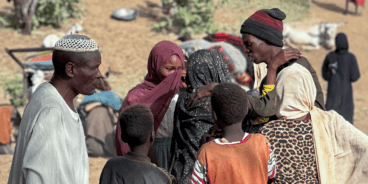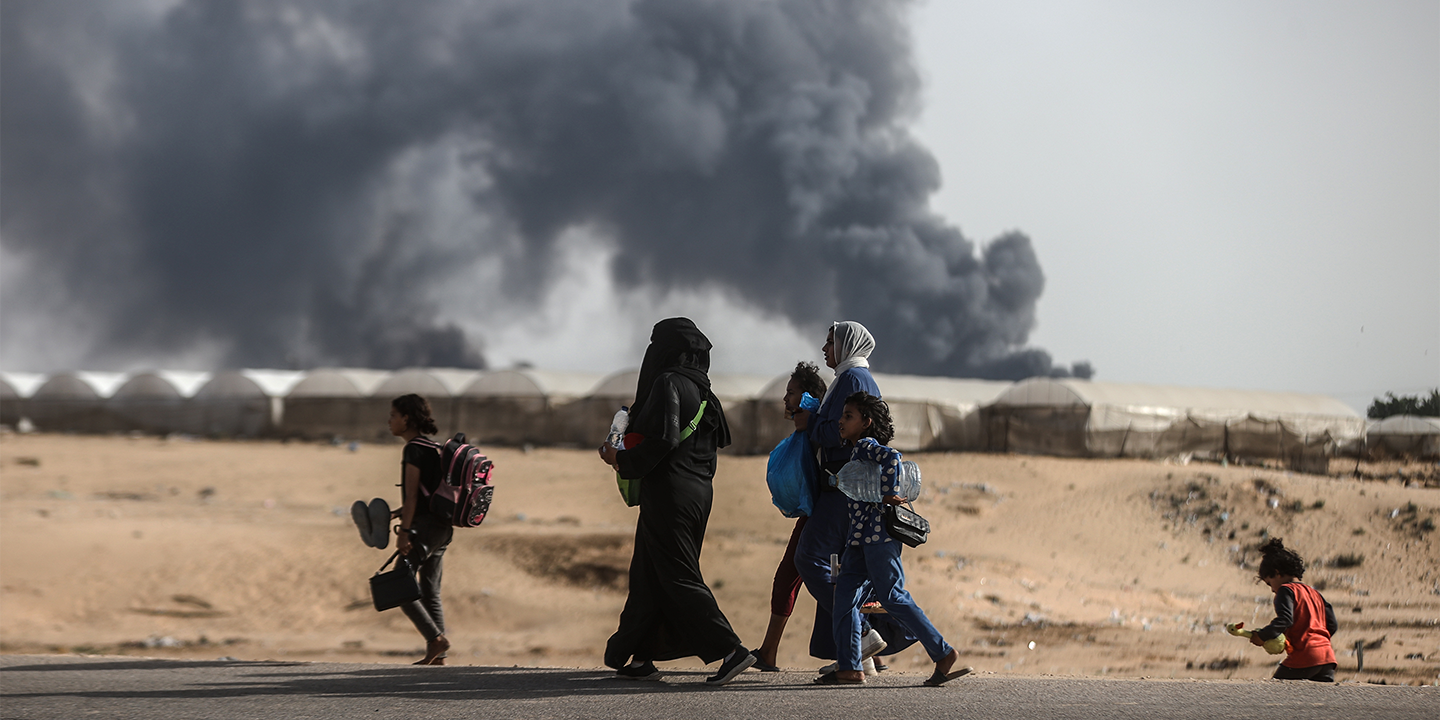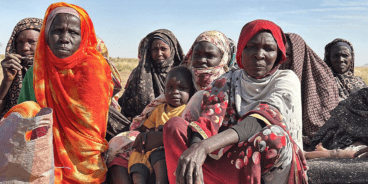

Atrocity Alert No. 397: Israel and the Occupied Palestinian Territory, Sudan and Protection of Civilians in Armed Conflict
Atrocity Alert is a weekly publication by the Global Centre for the Responsibility to Protect highlighting situations where populations are at risk of, or are enduring, mass atrocity crimes.
DOZENS BRUTALLY KILLED IN ISRAELI STRIKES ON DISPLACEMENT CAMPS IN GAZA
On 26 May an airstrike by Israeli forces on a displacement camp in northwestern Rafah killed at least 45 Palestinians, mostly women and children, and injured 250 others. The camp was in an area previously designated as “safe” by Israel and to which Palestinians were directed to seek shelter. According to multiple reports, victims’ bodies were ripped to shreds and children’s bodies were found in fragments due to the intensity of the bombardment. Many victims were trapped under flames and burnt to death. Two days later, Gaza emergency services reported that Israeli tank shells hit a cluster of tents in Al-Mawasi – another area to which Israel directed Palestinians to flee for safety – killing at least 21 people, mostly women and children.
While Israel has denied the shelling in Al-Mawasi altogether, Israeli forces claimed that the 26 May strike targeted senior Hamas officials while Prime Minister Benjamin Netanyahu said that the civilian casualties were a “tragic mistake.” UN Under-Secretary-General for Humanitarian Affairs and Emergency Relief Coordinator Martin Griffiths said, “Whether the attack was a war crime or a ‘tragic mistake,’ for the people of Gaza, there is no debate. What happened last night was the latest – and possibly most cruel – abomination.”
Since Israel’s intensification in Rafah around 6 May, approximately 1 million people have been displaced. Palestinians are fleeing amid relentless bombardments and a dire lack of food and water due to a near-complete halt of lifesaving aid deliveries since Israeli forces seized the Rafah crossing in early May.
The strikes in Rafah came soon after Israeli forces bombed shelters housing displaced Palestinians in other areas of Gaza, including Jabalya, Nuseirat and Gaza City. Attacks continue to increase across several areas of northern Gaza, causing further displacement and killing and injuring Palestinian civilians.
On 24 May, following a request from South Africa, the International Court of Justice (ICJ) issued its third legally-binding provisional measures order calling on Israel to immediately halt its military offensive and any other action in Rafah “which may inflict on the Palestinian group in Gaza conditions of life that could bring about its physical destruction in whole or in part.” The ICJ further ordered Israel to “maintain open the Rafah crossing for unhindered provision of urgently needed basic services and humanitarian assistance.”
Savita Pawnday, Executive Director of the Global Centre for the Responsibility to Protect, said, “The horrors of these latest massacres – in so-called ‘safe zones’ of Gaza – have been condemned by the highest levels of the international community. Both the International Criminal Court and the ICJ have signaled very clearly the reality of likely international crimes being committed in Gaza. It is long past time for the United States and others aiding and abetting Israel’s ongoing atrocities to end their complicity and help bring this nightmare to an end.”
Israel must immediately implement all ICJ provisional measures orders. All states parties to the Genocide Convention must help ensure Israel’s compliance. All states should cease arms exports to Israel, as well as apply other economic and political measures necessary to ensure respect for international law. A permanent ceasefire should be urgently reached.
FIGHTING IN EL FASHER SHOWS NO SIGNS OF ABATING
On Wednesday, 22 May, Sudan’s paramilitary Rapid Support Forces (RSF) deliberately attacked and entered Abu Shouk, a displacement camp in El Fasher, North Darfur, forcing 60 percent of its 100,000 residents to flee. The RSF has allegedly beaten, tortured and extrajudicially detained civilians and looted their belongings. According to satellite imagery obtained by the Humanitarian Research Lab (HRL) at the Yale School of Public Health, the damage in and around Abu Shouk indicates the presence of the RSF in several civilian areas. “At present approximately 100 football pitches-worth of civilian dwellings have been destroyed in the past two weeks of the fighting,” according to HRL’s Director Nathaniel Raymond.
As fighting intensifies between the RSF and Sudanese Armed Forces in El Fasher, Médecins Sans Frontières (MSF) reported that more than 134 people have been killed and 900 wounded since 10 May. The MSF-supported South Hospital – one of the few medical facilities still able to function – has been hit twice by mortars and shelling since 25 May, killing and injuring patients. Hundreds of thousands of civilians remain trapped in El Fasher, lacking access to food, water and basic services as the RSF continues to relentlessly attack the area from multiple directions and block all supply routes. On 24 May UN Spokesperson Stéphane Dujarric said that more than a dozen trucks carrying aid for at least 121,000 people have been trying to reach El Fasher for over a month, but have been hampered due to insecurity, access impediments and delays at checkpoints.
Although several top UN officials have warned of an imminent attack on El Fasher and the UN Special Adviser on the Prevention of Genocide has raised alarm regarding ongoing risks of genocide in the Darfur region, the RSF has continued to expand its control across Darfur. The fall of major capital cities, including El Geneina in West Darfur, were followed by systematic campaigns of ethnic cleansing of non-Arab communities, possibly amounting to the crime of genocide. Civilians in El Fasher are currently facing similar atrocity risks.
The UN Security Council (UNSC), African Union, Intergovernmental Authority on Development and states with influence over the warring parties should continue to support efforts aimed at ending the fighting, while urgently prioritizing the protection of civilians in Darfur and the prevention of any further escalation in civilian harm. In particular, regional and sub-regional organizations, as well as the UNSC, must explore all options for civilian protection, including under Chapter VII and VIII of the UN Charter, to establish and maintain a permanent ceasefire and ensure humanitarian access. Member states who facilitate the transfers of arms, ammunition and other materiel to Darfur are in violation of the 2004 UNSC arms embargo and must be held accountable.
PROTECTION OF CIVILIANS IN ARMED CONFLICT
This year marks the 25th anniversary since the UN Security Council (UNSC) introduced the Protection of Civilians (POC) as an agenda item, as well as the 75th anniversary of the Geneva Conventions – a cornerstone of International Humanitarian Law (IHL) aimed at protecting victims of armed conflict. Despite these achievements, countless populations across the world are enduring the appalling immediate and long-term consequences of armed conflict. Jaclyn Streitfeld-Hall, Director of Policy and Research at the Global Centre for the Responsibility to Protect, said, “In far too many situations, state and non-state actors are increasingly and brazenly disregarding their legal obligations, while some states who profess to support the protection of civilians agenda are compounding protection crises around the world, including through the supply of weapons and other forms of military and security assistance.”
Describing the situation around the world as “resoundingly grim,” the UN Secretary-General’s annual report on POC recorded at least 33,443 civilian deaths in 2023, representing a 72 percent increase from 2022, while the proportion of women and children killed doubled and tripled respectively. The changing nature and context of contemporary armed conflict – such as asymmetric warfare and urban battlefields – leaves civilians at risk of a range of harms, including indiscriminate attacks, the targeting of civilian infrastructure and livelihoods and the use of explosive weapons in populated areas (EWIPA), among others. The use of EWIPA is a leading cause of civilian deaths and injuries during armed conflict. Last year nearly 30,000 civilians were killed and injured by explosive weapons in six conflicts alone: Gaza, Myanmar (Burma), Sudan, Syria, Ukraine and Yemen.
Millions of civilians have been forced to flee bombing and fighting, with many facing further protection risks and enduring harsh living conditions. In the Democratic Republic of the Congo, Sudan, Gaza and elsewhere, displacement camps are routinely targeted and attacked, resulting in civilian casualties, secondary displacement and further trauma. Meanwhile, far too many civilians face hunger, starvation and disease as their access to life-saving humanitarian assistance is denied or otherwise impeded – a commonly used weapon of war. Humanitarian and UN personnel providing vital aid and protection are also increasingly becoming victims of attacks. More than 500 humanitarian aid workers were victims of violence in 2023, with over 250 killed. On 24 May the UNSC adopted a resolution calling for the protection of humanitarian and UN personnel in conflict and demanding that all combatants protect them in accordance with international law.
The international community must intensify prevention efforts and take steps to ensure that the world’s most vulnerable get the effective protection that they need and deserve. All states should uphold their obligations under IHL, as well as use their leverage to ensure that all parties to a conflict, and those supporting them, respect international norms and standards. All member states must endorse and effectively implement the EWIPA Political Declaration and Safe Schools Declaration. The international community should resource and commit to strengthening international and domestic accountability mechanisms to end the culture of impunity.
Related Content


Joint Statement: Genocide Returns to Darfur
